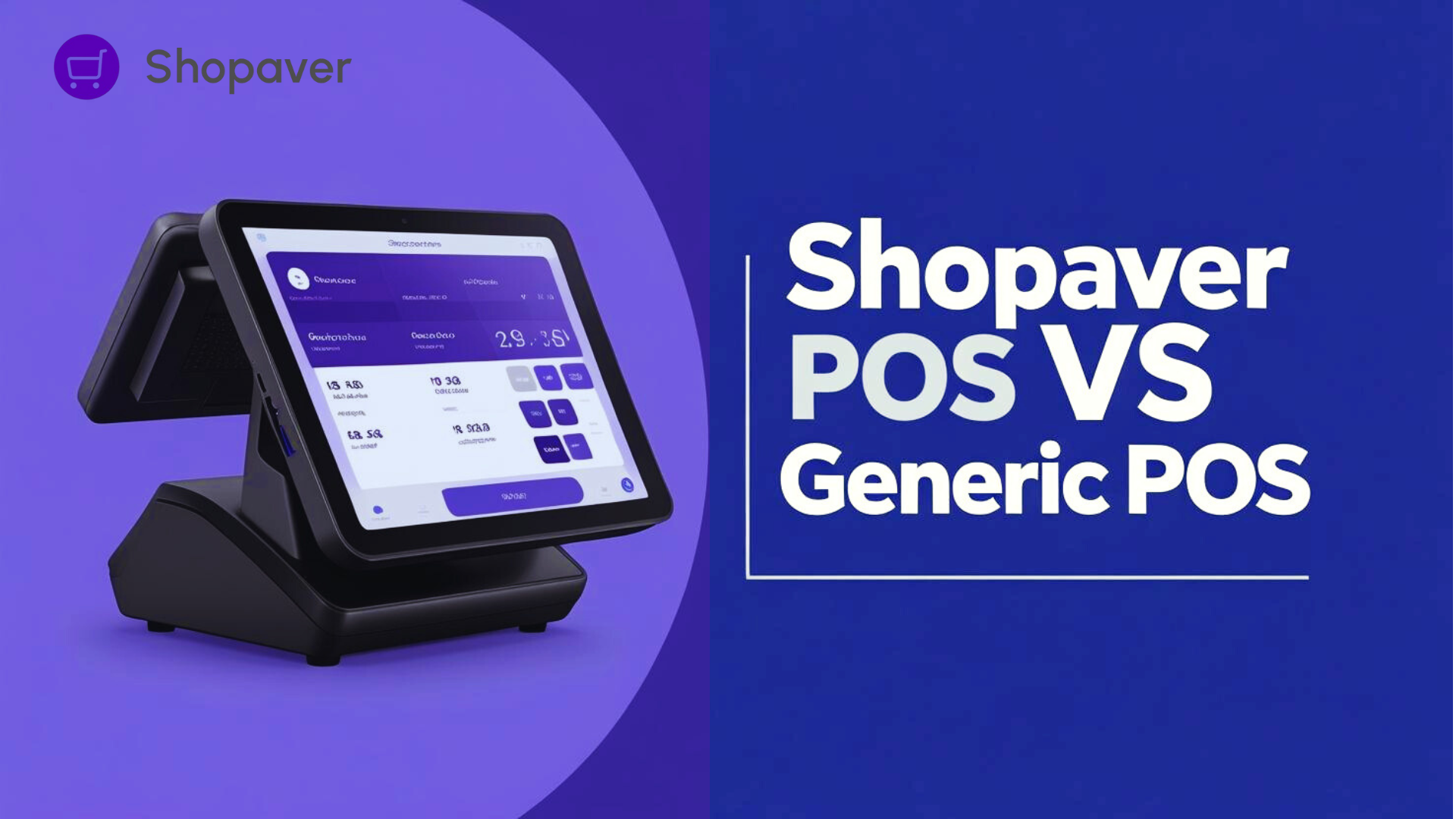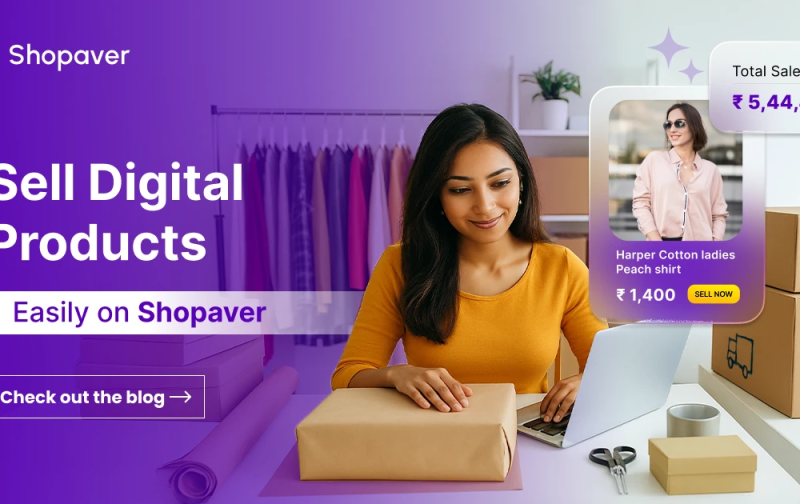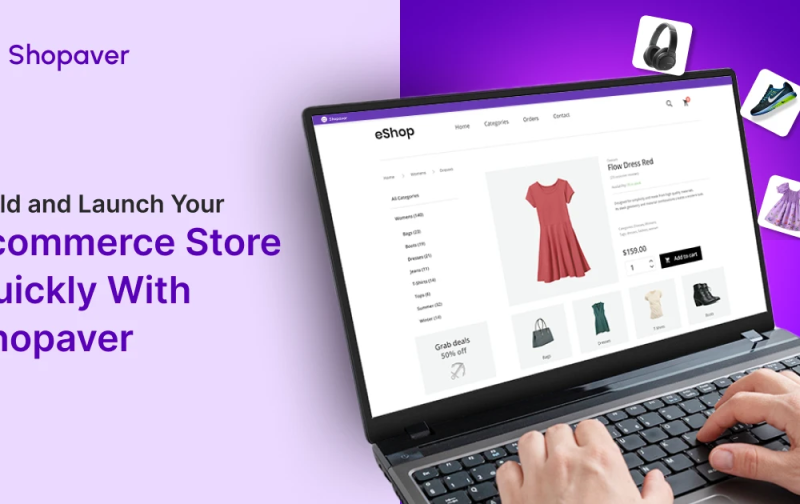A Point of Sale (POS) system is no longer just a billing tool, it’s the backbone of operations. Whether you’re running a grocery store, supermarket, boutique, or cafe, your POS affects everything: customer experience, inventory management, reporting, compliance, and ultimately, your profitability.
However, not all POS systems are created equal. Many businesses still rely on generic POS systems that focus only on billing. These systems often fail to meet the complex needs of modern retailers, especially grocery stores, where speed, accuracy, and inventory precision are crucial.
This is where Shopaver POS comes in. Designed specifically for growing retailers, Shopaver combines billing, inventory, customer loyalty, analytics, and online integrations into one platform. It bridges the gap between offline and online commerce while ensuring businesses remain efficient and customer-focused.
Learn comparison of Shopaver POS vs Generic POS across multiple dimensions — features, usability, scalability, compliance, and overall business value — so you can clearly see which one is the right fit for your store.
1. Ease of Use & Checkout Speed
Generic POS:
Generic POS systems are built with limited features, primarily focusing on cash register operations. While they can process basic transactions, they often lack advanced integrations like barcode scanning, weighing scales, or multi-payment options. This results in slower checkout experiences, especially during peak grocery rush hours.
Shopaver POS:
Shopaver offers a fast, intuitive, and user-friendly interface. Features like:
- One-touch billing
- Barcode scanning
- Digital weighing scale integration
- Split payments (cash + UPI/card)
This ensure customers spend less time waiting in line. The design is so simple that even new staff can learn operations in minutes, reducing training costs and errors.
Winner: Shopaver POS
2. Inventory & Stock Management
Generic POS:
Generic systems don’t go beyond recording sales. Inventory tracking is manual, prone to errors, and doesn’t account for expiry dates, stock wastage, or reordering alerts — all of which are crucial in grocery and retail.
Shopaver POS:
Shopaver provides real-time inventory management with advanced features:
- Auto stock updates with every sale.
- Low-stock and out-of-stock alerts.
- Expiry date and batch tracking.
- Supplier management for quick reorders.
For grocery stores dealing with perishable items, this eliminates wastage and ensures shelves are always stocked.
Winner: Shopaver POS
3. Multi-Payment Options
Generic POS:
Most generic systems accept only cash or basic card transactions. In today’s digital-first India, this limits customer convenience.
Shopaver POS:
Supports all modern payment methods including:
- UPI apps like PhonePe, Google Pay, Paytm.
- Credit/Debit card swipes with EMV support.
- Mobile wallets and QR-based payments.
- Split billing options for maximum flexibility.
This ensures every customer walks away satisfied, no matter how they prefer to pay.
Winner: Shopaver POS
4. GST & Compliance
Generic POS:
Compliance with Indian taxation laws (GST, HSN/SAC codes) is not a built-in feature of most generic systems. Businesses often rely on manual calculations, which increase risks of errors, penalties, and compliance delays.
Shopaver POS:
Fully GST-compliant with features like:
- Automated GST calculation on bills.
- GST-ready invoices as per Indian law.
- Integrated HSN/SAC code database.
- Reports for easy GST return filing.
Winner: Shopaver POS
5. Customer Loyalty & CRM
Generic POS:
Generic systems are transactional — they don’t store customer data or support loyalty programs. This makes it hard to encourage repeat purchases.
Shopaver POS:
Built-in Customer Relationship Management (CRM) tools allow businesses to:
- Track customer purchase history.
- Run loyalty points and reward programs.
- Send personalized SMS, WhatsApp, or email offers.
- Understand shopping behavior and preferences.
This ensures grocery stores not only acquire customers but also retain them.
Winner: Shopaver POS
6. Reporting & Analytics
Generic POS:
Reporting is often limited to sales summaries. Business owners don’t get insights into profitability, best-selling products, or customer behavior.
Shopaver POS:
Provides advanced reporting dashboards:
- Daily, weekly, and monthly sales analysis.
- Profit & loss reports.
- Fast- and slow-moving product reports.
- Employee performance tracking.
- Peak-hour footfall analysis.
This data empowers store owners to make informed, data-driven decisions.
Winner: Shopaver POS
7. Multi-Store & Franchise Management
Generic POS:
Most generic systems are stand-alone. Managing multiple branches or franchises becomes chaotic, requiring separate systems at each outlet.
Shopaver POS:
- Centralized control for all stores.
- Outlet-specific reports and analytics.
- Unified inventory across branches.
- Centralized promotions and pricing.
Perfect for grocery chains and retailers planning expansion.
Winner: Shopaver POS
8. Offline & Cloud Access
Generic POS:
Usually runs only on local servers. If the system crashes or internet fails, billing halts, causing business losses.
Shopaver POS:
- Works offline (sales data auto-syncs once online).
- Cloud-based access allows owners to manage operations from anywhere.
- Secure backups prevent data loss.
Winner: Shopaver POS
9. Integration with Online Orders & Delivery
Generic POS:
Generic systems are not designed for the online-first retail world. No direct integration with delivery platforms or e-commerce is available.
Shopaver POS:
Supports omnichannel retailing with:
- Online order acceptance directly into the POS.
- Integration with delivery partners.
- Unified inventory for offline and online sales.
- Click-and-collect support.
This helps grocery stores seamlessly expand into online sales without needing a separate system.
Winner: Shopaver POS
10. Scalability & Future-Readiness
Generic POS:
What works for a small shop often fails for a growing business. Generic systems lack scalability for chains, advanced features, and integrations.
Shopaver POS:
Built to grow with your business. Whether you start with one counter or expand into a multi-city franchise, Shopaver adapts with:
- Unlimited counters and outlets.
- Customizable features.
- API integrations for future tech.
Winner: Shopaver POS
Shopaver POS vs Generic POS: Quick Comparison Table
| Feature | Generic POS | Shopaver POS |
|---|---|---|
| Billing Speed & Ease | Basic | Advanced, Fast, Scalable |
| Inventory Management | Limited | Real-Time, Expiry Tracking |
| Payment Methods | Cash, Card | UPI, Wallets, Split Billing |
| GST Compliance | Manual | Automated, GST-Ready |
| Customer Loyalty | Not Available | Integrated CRM & Rewards |
| Reporting & Analytics | Basic Sales | Advanced Dashboard |
| Multi-Store Management | Not Supported | Centralized Control |
| Offline & Cloud Access | Local Only | Offline + Cloud |
| Online Order Integration | Not Available | Fully Integrated |
| Scalability & Future-Ready | Low | High |
Why Shopaver POS is the Clear Winner
When comparing Shopaver POS vs Generic POS, the differences are clear. Generic systems may be cheaper upfront, but they are limited, outdated, and often end up costing more in inefficiencies, lost customers, and compliance risks.
On the other hand, Shopaver POS is built for modern retail:
- It saves time with faster billing.
- It saves money by reducing wastage and errors.
- It increases revenue with loyalty and marketing tools.
- It future-proofs businesses with online integrations.
In 2025, retail businesses, especially grocery stores, cannot afford to run on outdated, generic POS systems. Customers demand convenience, speed, and personalization, while businesses need efficiency, compliance, and scalability.
Shopaver POS isn’t just another POS; it’s a complete retail management solution. From billing and inventory to customer loyalty and online sales, Shopaver delivers everything retailers need to thrive in today’s competitive market.
FAQs About Shopaver POS vs Generic POS Systems
1. What is the main difference between Shopaver POS and a generic POS system?
Shopaver POS is a comprehensive retail management platform designed specifically for growing retailers, combining billing, inventory, customer loyalty, analytics, and online integration. Generic POS systems typically focus only on basic billing and lack features like real-time inventory tracking, GST compliance, loyalty programs, and online sales integration.
2. How does Shopaver POS improve billing and checkout speed compared to generic systems?
Shopaver POS offers advanced features such as one-touch billing, barcode scanning, integration with digital weighing scales, and multi-payment options (including split billing).
This enables faster, more accurate checkouts and reduces queues, especially important during peak hours. Generic systems often lack these features, leading to slower billing.
3. Can Shopaver POS help manage inventory better than generic POS solutions?
Yes. Shopaver POS provides real-time inventory updates with features like expiry date tracking, batch management, low-stock alerts, and supplier management. Generic POS often requires manual stock management, prone to errors and does not handle perishables well.
4. Does Shopaver POS support modern payment methods?
Absolutely. Shopaver POS supports UPI apps (PhonePe, Google Pay, Paytm), credit/debit cards with EMV, mobile wallets, QR payments, and split payment options. Generic systems usually accept only cash or basic card payments.
5. How does Shopaver ensure GST compliance?
Shopaver POS is fully GST-compliant with automated GST calculations, GST-ready invoices, integrated HSN/SAC code databases, and generates reports to simplify GST returns filing. Generic systems often lack these built-in compliance features, causing errors and compliance risks.
6. Can Shopaver POS help increase customer loyalty?
Yes. Shopaver includes built-in CRM tools that track customer purchase history, run loyalty and rewards programs, and send personalized offers via SMS, WhatsApp, or email—helping retailers retain and engage customers. Generic POS systems typically have no customer engagement features.
7. What kind of reporting and analytics does Shopaver POS provide?
Shopaver offers advanced reporting dashboards including sales trends, profit & loss reports, product movement (fast/slow), employee performance, and peak hour footfall. Generic POS mostly provides basic sales summaries without detailed insights.
8. Does Shopaver support multi-store or franchise management?
Yes. Shopaver allows centralized control over multiple outlets, unified inventory management, outlet-specific reports, and centralized promotions/pricing, making it ideal for expanding businesses. Generic POS systems generally cannot handle multiple store management effectively.
9. Is Shopaver POS’s offline functionality reliable?
Shopaver works offline during internet outages by syncing sales data automatically once online. It also offers cloud access, enabling store owners to manage operations remotely with secure data backups. Generic systems typically rely on local servers and may halt operations if connectivity is lost.
10. Can Shopaver POS integrate with online orders and delivery platforms?
Yes, Shopaver supports omnichannel retail by integrating online orders directly into the POS system, working with delivery partners, unifying inventory for offline and online sales, and offering click-and-collect options. Generic POS systems usually lack these capabilities.
11. How scalable is Shopaver POS for growing businesses?
Shopaver is highly scalable and customizable, supporting unlimited counters, outlets, and API integrations to accommodate evolving business needs. Generic POS systems often fail to meet requirements beyond small, single-store setups.
12. Will switching to Shopaver POS reduce overall costs?
Although Shopaver may have a higher upfront cost compared to generic POS systems, it ultimately reduces costs by minimizing wastage, reducing errors, saving staff training time, improving compliance, and boosting revenue through loyalty and marketing features.
13. Is Shopaver POS user-friendly for new staff?
Yes. Shopaver’s intuitive interface allows new employees to learn operations within minutes, reducing training time and minimizing errors, which is often not the case with generic systems.
14. How do I know if Shopaver POS is right for my store?
If you’re a growing retailer or grocery store looking for faster billing, accurate inventory control, GST compliance, customer engagement, online integration, and multi-store management, Shopaver POS is designed to meet those needs efficiently.
15. How can I get started with Shopaver POS?
Contact Shopaver for a demo or trial to see how their tailored features fit your business. Switching from a generic POS is streamlined with support to migrate your data and train your team.



